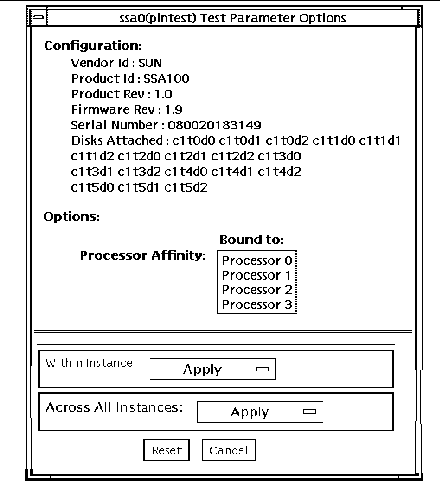| C H A P T E R 42 |
|
SPARCstorage Array Controller Test (plntest) |
plntest checks the functionality of the controller board on the SPARCstorageTM Array. The SPARCstorage Array (SSA) is a large disk storage I/O subsystem capable of housing up to 30 SCSI hard drives. The SSA communicates with a host system over a fiber-optic link provided by an SBus-based host adapter card in the host system and the corresponding SSA controller board hardware.
The SSA controller card is an intelligent, CPU-based board with its own memory and ROM-resident software. In addition to providing a communications link to the disk drives, it also buffers data between the host system and disk drives in its nonvolatile RAM (NVRAM). For data to go from the host to a particular disk, it must first be successfully transferred to this NVRAM space.
The host machine, SBus host adapter card, Fibre Channel connection, and the SSA controller board must be working properly to perform this data transfer operation. By verifying and stressing this operation, plntest can isolate failures on the SSA disk drives from failures on the SSA controller board.
|
Note - disktest transfers data on the SSA disk drives over the same path mentioned above. However, disktest does not transfer data as quickly as plntest. |
The plntest exercises the hardware and software by invoking SCSI read buffer commands of various sizes to the NVRAM. These operations exercise the host Fibre Channel hardware, the SSA Fibre Channel hardware, the SSA resident management software, and the hardware component interaction on the SSA controller card (all components except the SCSI devices). In addition, the plntest reports failure of the fan module and the NVRAM battery module of the SPARCstorage Array.
Unlike most other hardware devices, the SSA controller card does not have a logical device name (one you would find in the /dev directory). Therefore, the SSA controller card is identified by its longer, physical device name.
|
Note - The physical device name of the SSA controller card cannot be used to run plntest. |
When running plntest from the command line, the physical device name of the SSA controller card cannot be used, so a logical name must be specified. ANSI standards require commas as delimiters between items. Since the physical name of the SSA controller contains embedded commas, if you use a physical name that contains commas as a command-line option, plntest misinterprets the option.
There are two ways that you can create a logical name:
Run the SunVTS kernel (vtsk), which automatically creates a logical name entry for the SSA controller under the /dev directory, such as:
Use this name as the parameter for the dev= option of plntest.
Manually make a soft link from the actual physical device name to a logical name of your choice (under /dev). Use this name as the parameter for the dev= option of plntest, as shown in the following example:
To reach the dialog box below, right-click on the test name in the System Map and select Test Parameter Options. If you do not see this test in the System Map, you might need to expand the collapsed groups, or your system may not include the device appropriate to this test. Refer to the SunVTS User's Guide for more details.
FIGURE 42-1 plntest Test Parameter Options Dialog Box

Configuration lists the names of all the logical disk drives (both single and grouped) that are attached to the SPARCstorage Array controller board. plntest is not a scalable test.
|
Note - If no disks are present, none is displayed under the Attached Disks heading. |
/opt/SUNWvts/bin/plntest standard_arguments -o ?,dev=device_name,x
|
Probes the system for valid SSA controller devices and prints them to screen (see Probing for SSA Controller Devices). |
|
|
Specifies the physical path name of the SSA controller card to be tested. This argument must be included when running plntest from the command line, unless the ? argument is used. |
|
|
Probes the specified SSA controller card for the single and grouped disks attached to the controller card, and prints their logical names to the screen. Note: The dev=device_name option must be specified for this option to work. |
|
Note - 64-bit tests are located in the sparcv9 subdirectory: /opt/SUNWvts/bin/sparcv9/testname. If a test is not present in this directory, then it may only be available as a 32-bit test. For more information refer to 32-Bit and 64-Bit Tests. |
Copyright © 2002, Sun Microsystems, Inc. All rights reserved.